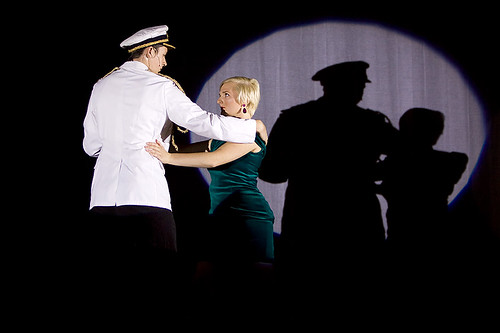Musical Review – Evita
* * *
George Watson’s College
By Thom Dibdin
There is a genuine tune-hummer of a production of Evita up at George Watson’s College this week, one which is strong and forceful where it needs to be – but is also fully-rounded on the musical front.
Minimal and unfussy staging makes good use of side-projected slides and video to help give the whole a well-judged political edge. It shows, without pulling its punches and while exploring the cult of Evita, where Perónism lies on the totalitarian spectrum.
It is music which lies at the heart of the production’s strengths, however. Having a large orchestra is something of a luxury in musical theatre circles and the company makes full use of the depth and texture a 32-strong band can provide – despite the odd wayward note in the more complex parts of the arrangement.
The orchestra serves the singers well, too, never becoming so loud as to drown out what is happening on stage. Although that doesn’t mean that the chorus don’t drop the volume down just a little too far on the odd occasion.
There is never any such problem for Chris MacFarlane, who takes on the key role of Ché Guevara. He delivers on all the necessary levels as he stalks the production, haughtily arrogant towards his fellow Argentineans who have been sucked in to Evita’s personality cult.
He still gives his character enough detachment to be able to step in, as required, to hustle the plot along. He is always there to pinch and push as it follows Eva Duarte’s rise from her peasant origins as the daughter of her middle-class father’s mistress, her manipulation of men around her to rise to power as Juan Perón’s second wife, her Rainbow tour to Europe and early death from cancer.
MacFarlane also has the vocal ability to ensure that Ché gives Eva Perón a torrid time of it. There is a real sneer to his singing at times, in his contempt for her attitude to their country.
Monica Reeves, who is singing the title role on alternate performances, gives a fantastic vocal account of Evita in her prime and her decline. There is room for manoeuvre in in the opening scenes, though, where Reeves could afford to give the 14 year-old Eva a bit more brash naivety as she manipulates her first lover, Agustin Magaldi, into taking her to Buenos Aires.
That is little matter when she comes out singing Don’t Cry For Me Argentina at the start of the second half, flanked by Juan Perón and playing to her adoring public from the palace balcony.
There is no doubting that Reeves’ Evita is one cold-hearted, brutal and Machiavellian operator. It is a chilling, thought-provoking rendition of an iconic song. One which might glance tenderly across the range but which also wields real power.
If you are going to opt for minimal staging, as Watson’s has done, then there has to be something to maintain the production’s balance. The recompense here is clear enunciation that makes you feel as if you are hearing Tim Rice’s lyrics for the first time.
The staging makes good use of a simple split staircase that can double as a palace balcony. Context and commentary all come from slides and old news footage played out on screens on either side of the stage.
It’s effective stuff, which is only let down slightly by the lack of movement from some of the main characters. While Daniel Williamson has a strong, full-toned voice as Juan Perón, there is nothing in his movement to give any indication of the man behind his stoic exterior.
Mostly, this doesn’t matter a jot, but the one moment where he does need to move is in the scene where he meets the young Eva with their duet, I’d Be Surprisingly Good For You. The tango danced between the two would have given exactly the right framework for their relationship, if it had only been given a bit of fire from both sides.
This is not just the Eva, Ché and Juan show, either. There are excellent performances right through the cast. Craig Donoghue is a calm and poised tango singer as Agustin Magaldi with Night of a Thousand Stars. But it is Gaby Votta who really catches the ears as Perón’s spurned mistress. Her voice carries all the bitterness and regret required – delivered with vocal strength.
A thoroughly satisfying production which captures something of the politics of Argentina in the 1940s and uses that to frame the memorable tunes.
Run ends Friday 18 June




















